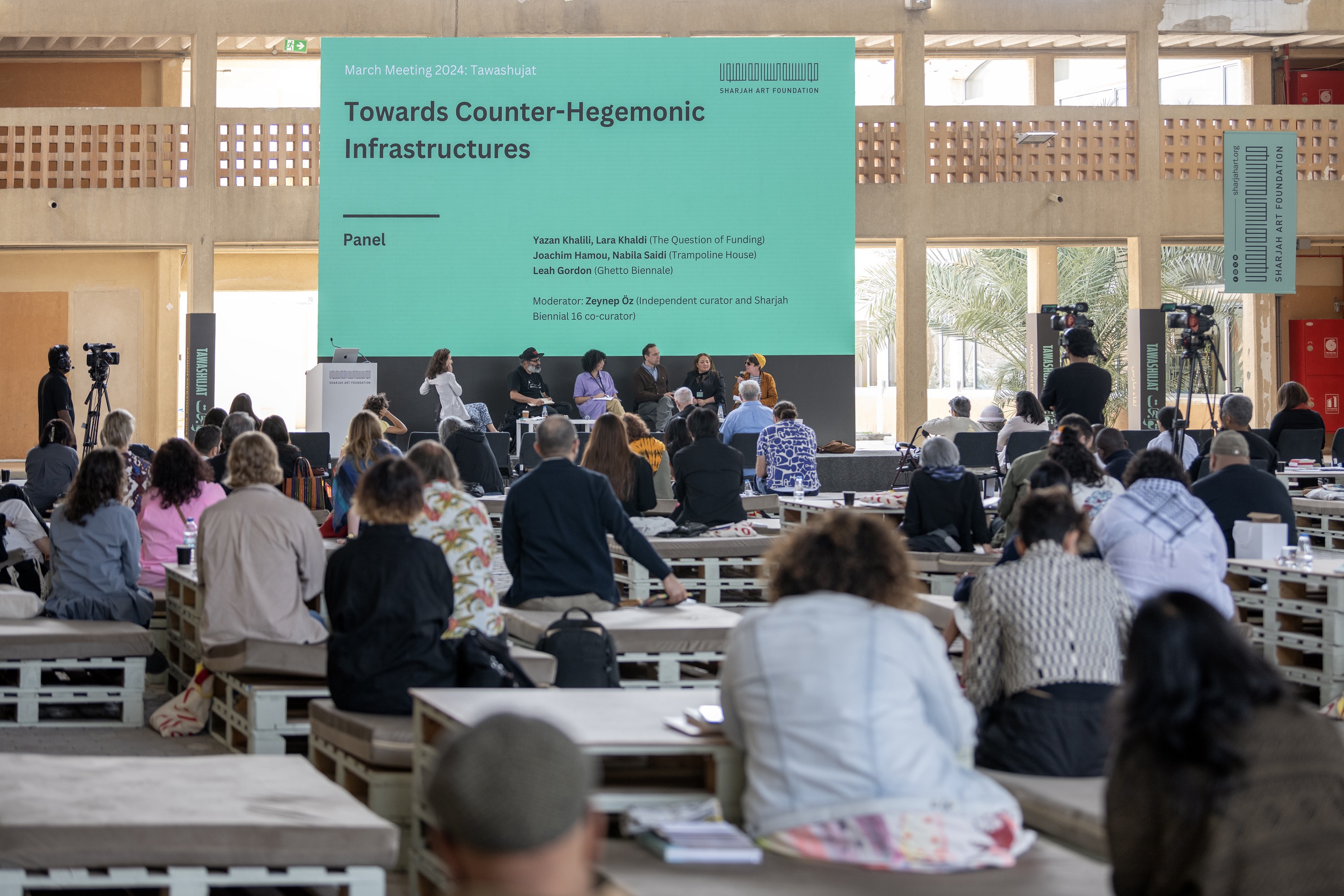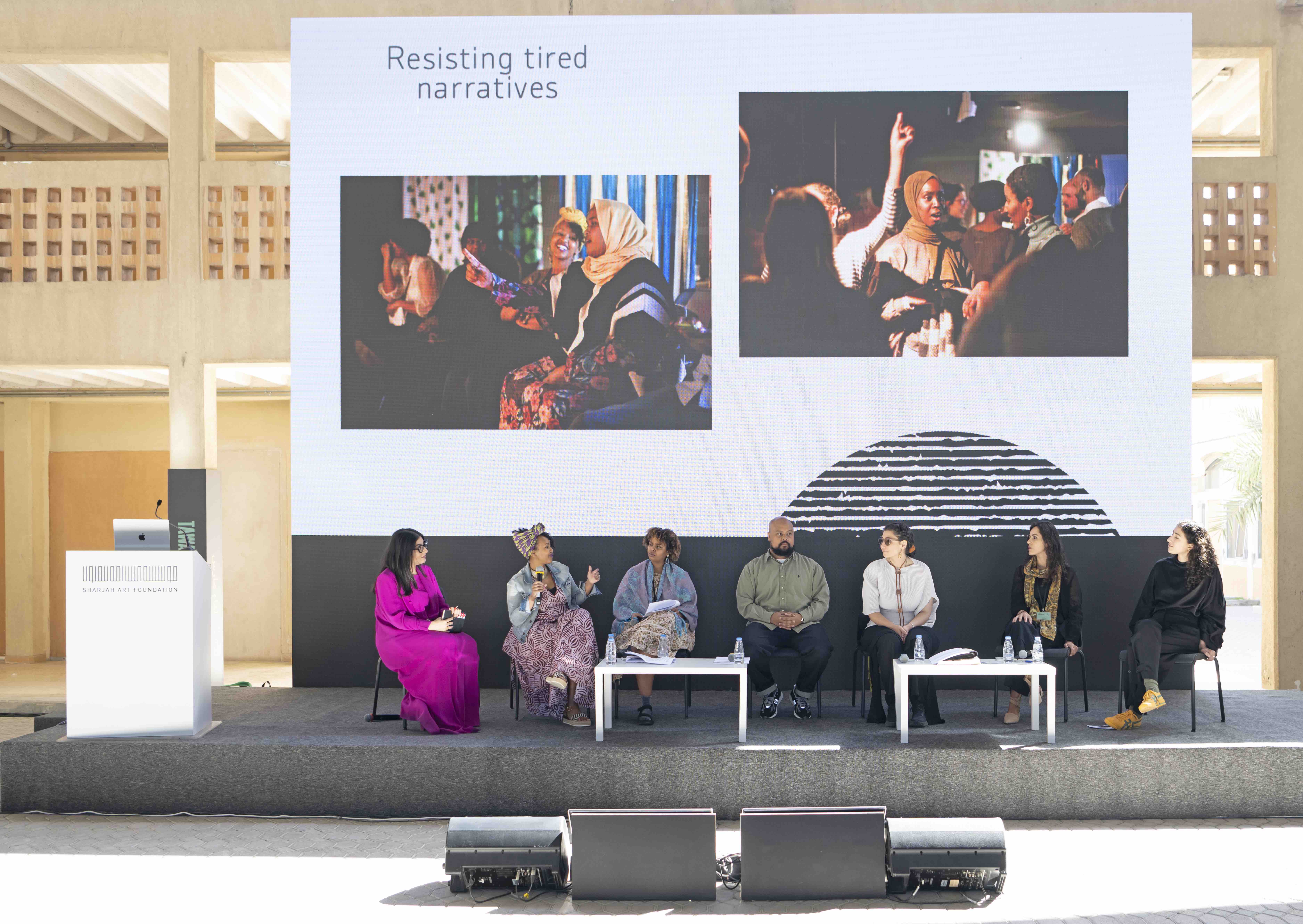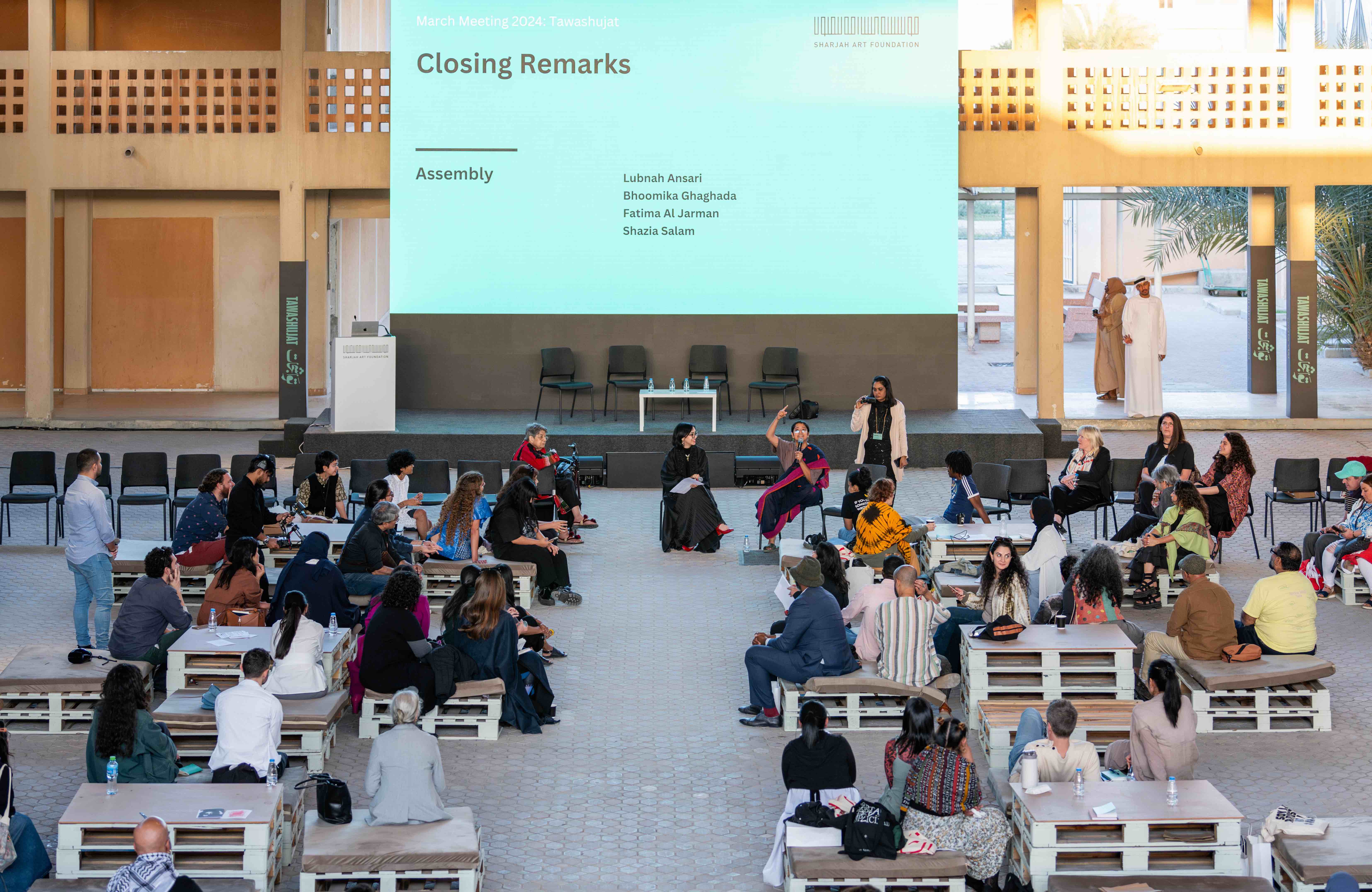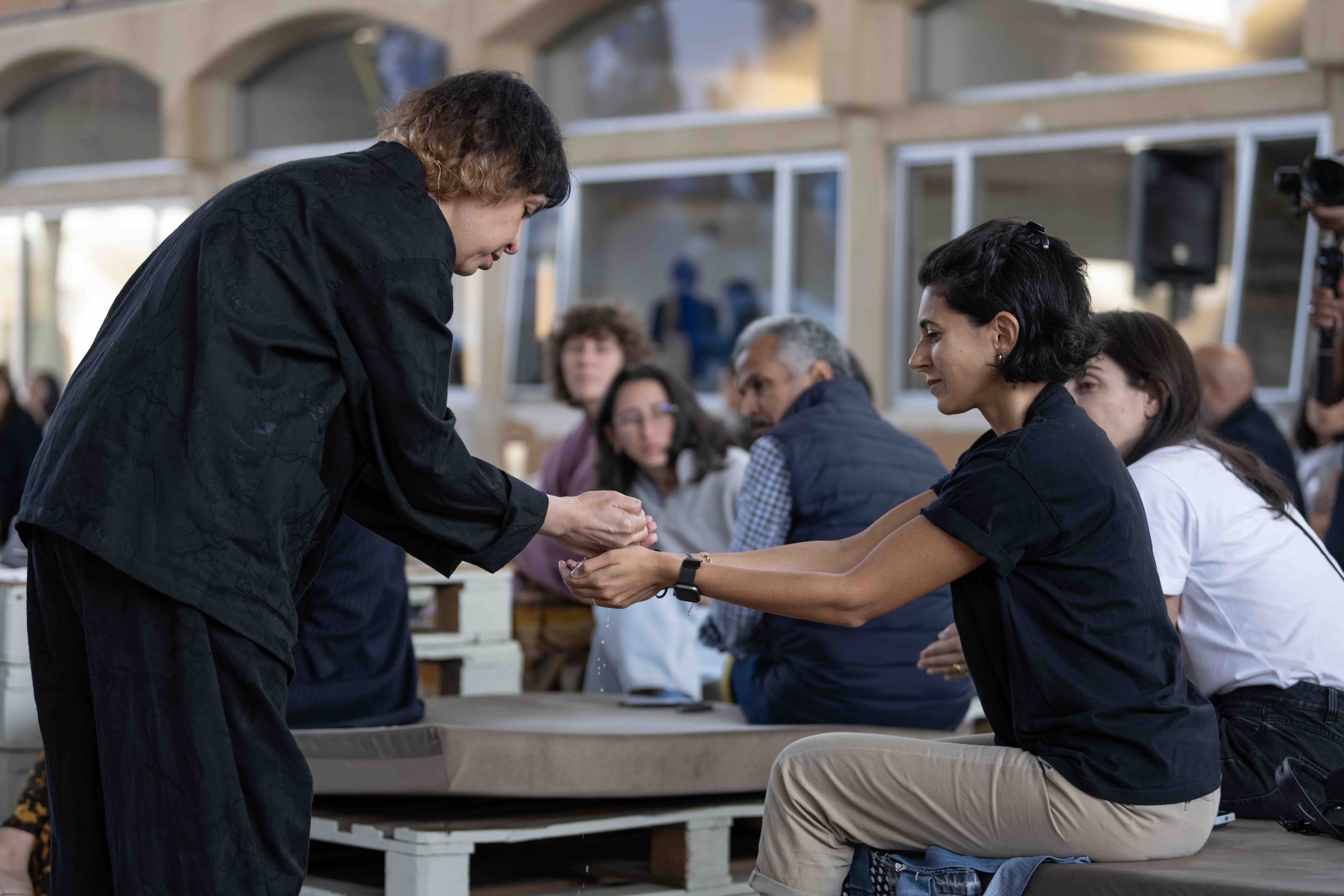Fostering a feeling of community, March Meeting 2024: Tawashujat brought together cultural practitioners from diverse backgrounds and places from 1 to 3 March. More than 80 international participants working in various disciplines, from visual arts, literature, music to film, convened at Khalid Bin Mohammed School in Al Manakh, Sharjah, to deconstruct themes of collectivity, in line with the Arabic word tawashujat, referring to the ‘intertwining’ of ideas. Following the inaugural remarks delivered by Hoor Al Qasimi, President and Director of Sharjah Art Foundation, the meeting examined how collaborative work can enhance artistic agency and recentre issues often relegated to the margins of social, cultural and political life.
Interconnected opportunities for shared reflection and dialogue unfolded simultaneously via lectures, panel discussions, performances, readings and workshops. Each day, attendees, organisers and facilitators shared meals together, opening up the opportunity to convene, discuss and create new connections. Participants weaved in and out between the engagements taking place within the repurposed classrooms of the historic building and its central courtyard.
Taking place against the backdrop of conflict in the region and beyond, the 16th edition of the meeting acknowledged the ongoing genocide in Gaza as well as the cultural and infrastructural destruction inflicted on Palestinians, and extended this solidarity to populations affected by strife worldwide, including Sudan, Congo, Armenia, Kashmir and other parts of the world. By bringing together embodied practices that consciously merge diverse forms of art-making and community-building, the programme highlighted the fact that only through the power of collective action can we effectively challenge structures of inequality.
The three-day programme commenced with a thought-provoking panel discussion titled The Catalytic Power of Collectives moderated by Amal Khalaf (Director, Cubitt; Curator at Large, Public Practice, Serpentine and Sharjah Biennial 16 co-curator). The conversation—between Ivet Ćurlin (Artistic Director, Kunsthalle Wien and member, What, How & for Whom); Sofia Villena Araya, Deniz Kirkali, Amelie Wedel (topsoil); and Mirwan Andan (ruangrupa)—centred on the dismantling of hierarchical paradigms prevalent within the art world. The panelists envisioned alternative modes of collaboration that could support the realisation of new liberated imaginaries.
Writer Tariq Ali followed the discussion with a keynote address, titled On Being in the World, which looked at how politics is inseparable from culture. This has been a universal and timeless condition, he explained, the difference now being that new technologies speed up the transmission of culture to global audiences, bypassing traditional media channels which often manipulate narratives. He drew the audience's attention to the current tragedy of Gaza, taking place in close proximity to us, which he felt captivated the world’s consciousness thanks to the live stream of images. In the face of crisis, cultural producers have a fundamental choice between remaining silent, justifying the oppression, or critically challenging the situation as much as within their capacity, Ali stated.
Dynamic workshops held concurrently with the talks offered a more hands-on engagement with approaches that reconfigure the role of art in our communities and times. Reimagining Library Practices, led by members of the Seeds collective, contemplated the historical implications of different libraries and texts. The workshop reconsidered the relevance of these libraries and engaged in exercises for a more embodied reading, urging the audience to explore other desirable textual formats.
Later in the evening, the audience shared a poignant moment with Mosab Abu Toha who was unable to travel because of the limitations placed on Palestinian identity documents. He joined the meeting from Cairo via a video call for a moving reading from his acclaimed collection of poetry Things You May Find Hidden in My Ear. He narrated passages chronicling the complexity of life under siege in Gaza, alongside the works of his peer, the late Palestinian writer and poet Refaat Alareer. At the end of this segment, Abu Toha reminded the audience about the unique aspect of the current situation in Gaza—that it is a genocide unfolding live rather than one relegated to a moment in history. He explained that regardless of our physical absence on the ground, we are all part of what’s happening there, and for this reason, our shared and collective action and solidarity across borders is urgent and crucial in overcoming the ongoing occupation of Palestine.
The first day came to a close with Shayma Hamad’s culinary performance Not Food. Inspired by the artist’s observation and reflections on how women in Palestine cope at times of adversity, the performative dinner invited audiences to contemplate the meaning of death and the rituals of mourning through communal dining. Carrying out gestures of dough-making and kneading resonant with the act of digging, the artist shared stories from the lives of women who had to excavate a place for the deceased. The sorrowful evening meal poetically revealed how food can become a means for prayer and community.
The next morning, the participants gathered across clusters of grouped seating arrangements in the school courtyard. The day began with the panel Towards Counter-Hegemonic Infrastructures moderated by Zeynep Öz (Independent curator and Sharjah Biennial 16 co-curator). The interlocutors—Yazan Khalili and Lara Khaldi (The Question of Funding); Joachim Hamou and Nabila Saidi (Trampoline House); and Leah Gordon (Ghetto Biennale)—underscored a sense of hope within struggle. They shared varied encounters and actions, from Palestine and Haiti to Denmark’s refugee and migrant communities, demonstrating inclusive and grassroots possibilities, and reflecting counter-hegemonic organising principles that can exist within art infrastructures.
In the afternoon, Jumana Emil Abboud blended folk tale, water lore and myth with present-day lived experience in her spoken-word performance, titled The Father of Stars, The Mother of One Day, unfolding as a cultural antidote to the scars of displacement. Carrying a water-filled vessel through the audience, the artist cupped the water in her hand and gave it to the attendants, asking them to distribute it to people as a metaphor for co-authored storytelling processes that can tenderly hold our fragmented selves with care across histories.
The panel kicking off the third and last day opened with a panelist reading a quote by James Baldwin: ‘The role of the artist is exactly the same as the role of the lover. If I love you, I have to make you conscious of the things you don’t see.’ The discussion titled Identity, Memory and Materiality was moderated by Hadeyeh Nader Badri (Senior Adult Learning Coordinator, Sharjah Art Foundation) and featured Ayan Cilmi, Fozia Ismail (dhaqan collective); Soledad Muñoz, Matthew Asaminew (Woven Memory); María José Murillo (Noqanchis); and Yasmeen Mjalli (Nöl Collective). The speakers explored the intersection of contemporary art practices, cultural identity and collective memory through textile practices and material resources central to the global capitalist systems. In a similar vein, the parallel workshop Your Design... Your Story—led by Amman-based naqsh collective’s Nisreen Abu Dail and Nermeen Abu Dail—probed the visualisation of thoughts and stories through materials in embroidery, stone, wood and metal that combine traditional designs with contemporary aesthetics. As a participatory exercise the session led to a reflection of our shared stories through the artistic use of materials such as thread and felt.
To conclude March Meeting 2024: Tawashujat, artists and writers Bhoomika Ghaghada, Shazia Salam, Lubnah Ansari and AlJarman invited the participants to share their experiences over the three days. This morphed into an open discussion on those whose absence was felt, the urgencies that had been acknowledged and the conversations that needed to be continued. Stepping down from the stage, they gathered everyone into a circle in the courtyard to embody the ethos of collectivity as a methodology for witnessing, mobilising and producing.




